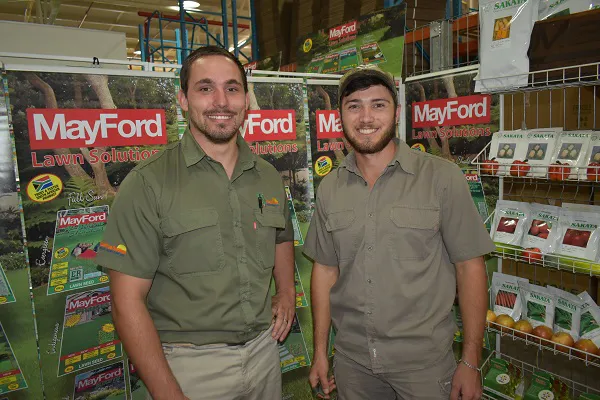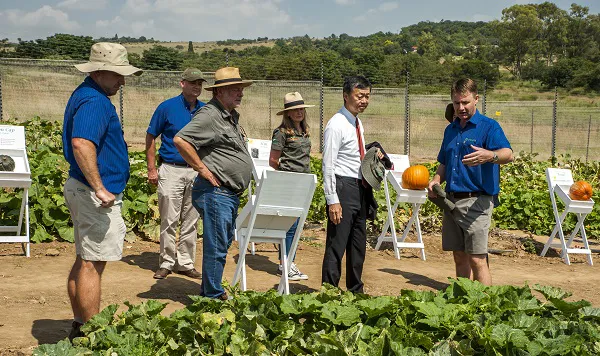Growers from neighbouring countries and across South Africa visited Sakata’s trial farm outside Johannesburg for an idea of what South Africa’s brassica and butternut market leader has to offer.
Extra fine beans, of between only 4 and 5mm in diameter (increasingly a supermarket requirement), was on show, in particular the new Tiezo* variety (an asterisk denotes that it does not appear in the South African variety list but has been submitted for registration).
Alex Bronkhorst, Sakata South Africa product development manager, discussing cauliflowers with André Voigt, cauliflower farmer all the way from Uitenhage, Eastern Cape
The Quantum butternut, the new topselling variety among all Sakata vegetable varieties in South Africa, showed its superiority where it was planted against competitor control varieties.
Quantum has a smaller fruit size than Pluto, the previous topseller, which makes it ideal for supermarkets, notes André de Villiers, the Sakata Cucurbitae specialist.
André de Villiers with Quantum butternut, Sakata's new topselling variety, displacing Pluto from top spot
“People get scared when they look at the price of F1 hybrids like Quantum or Pluto and then they plant Waltham, an open-pollinated variety,” André told visitors to the field day. “It’s very difficult to make money on Waltham these days due to its lack of uniformity in size and yield. Rather plant a hybrid, you get much higher yields and you make much more money.”
Atlas, Sakata’s oldest hybrid butternut variety in South Africa, introduced more than 20 years ago, is still the number one choice for processing, but Titan, introduced two years ago, has fruit even bigger than Atlas. Its very long neck is suited to processing, and results in less waste. Processors have reported up to 6% less waste than with Atlas, André notes.
Determinate Saladette tomato varieties a highlight Johan Stronkhorst, Solanaceae specialist (right), notes that it has been a difficult growing season with substantial rain leading to leaching and flower drop due to stress conditions, but the vigorous rows of tomatoes at Sakata’s trial farm serve to illustrate the highlights of the field day, he says.
Two segments are determinate and indeterminate saladette tomatoes, the latter used for shade net production for high yield.
“The saladette is a highlight, we’re on the right road,” Johan says.
”We have three outstanding varieties, two of them, the SV8444w and SV8579w varieties, have TY (tomato yellow leaf curl virus) resistance, the third, STM19017w, with tomato spotted wilt virus resistance and we’re getting the size, firmness and colouring right coupled with good foliage and vigour.” (w denotes seed in an early experimental phase, not commercially available yet.)
Tomato yellow leaf curl virus was pretty bad this season, he says, but in the trial the resistance of the F1 hybrid was clearly illustrated by the badly affected open-pollinated varieties grown as control crops.
Deon Lucas and Carolie Both coming from Robertson, Western Cape, to look at the tomatoes. They're from Smuts Brothers Agri, a major tomato producer
With indeterminate tomato varieties Sakata has been achieving disease resistance along with size, varieties that can be planted in summer and taken through into the winter at the end of the season.
“You don’t get one variety that works everywhere. You need different varieties for different areas and production cycles because winter and summer production requirements differ.”
“It’s becoming more difficult for farmers and the climate is changing. They don’t precisely know what to expect of the season. Some of the farmers here planted one variety for the past two years, it worked 100% for them, and the third year there’s a change to conditions and they’re back to the drawing board.”
Jamie Pasques, Sakata Eastern Cape sales representative, with Jan-Louis Bezuidenhout, Sakata South Africa commercial manager and Leon de Koning, a vegetable farmer from the Gamtoos
North West tomato farmers beat bacterial wilt through rootstock
The tomato rootstock Bowman is a commercially available tomato rootstock with resistance against bacterial wilt and Fusarium race 3.
Johan recounts that tomato plants in trials in Brits, North West Province, that previous years were ravaged by bacterial wilt by the time they reached knee height, showed a marked improvement when grafted on Bowman.
“This season they took off over 100 tonnes in those net houses under the same conditions. A tomato rootstock is an insurance policy – but it’s not a solution for poor management,” Johan warns. He also adds that if planted too deeply, a rootstock means nothing and proper sanitation practices should be followed.
Arno Rautenbach, root crop and bean specialist
Brand new broccoli varieties
Sakata also had some of their new generation brassicas on view at the open days. Ares* and Triton* are two brand new broccoli varieties that have just been launched into the market place.
Ares* is a very fast maturing summer variety suitable for pre-packing, while Triton* is usually recommended for the transitioning periods from summer to winter or from winter to summer and does very well as a processing or pre-packing variety.
Carmen Meyer, brassica and leafy crop specialist
Twister* is a very exciting new cauliflower variety with the ability to withstand extreme heat; its leaf wrap of this variety is exceptional, says Carmen Meyer, brassica specialist, making it perfectly suited for both pre-pack and processing requirements.
Sakata also featured cabbage, Superslam. The seedlings of this variety are very vigorous with good uniformity that ensures a very uniform crop.
The maintenance team of the handsome trial beds. Back: Daniel Marubini, Sannie Maseko, Nicholas Ndlovu, Emmanuel Machethe. Seated: Jimmy Mbatha and Freddie Maunatlala
Keiko Arai and Martin Manganye of the Centre for Japanese Studies at the University of Pretoria, with Geelbooi Masela, self-employed
 Ruan le Grange of WD Seedlings in Tzaneen with Koos Hartzenberg of Grootbek Boerdery, tomato, potato and onion producer in Limpopo
Ruan le Grange of WD Seedlings in Tzaneen with Koos Hartzenberg of Grootbek Boerdery, tomato, potato and onion producer in Limpopo
 Alex Bronkhorst (product development manager), Lindsay Campleman (managing director of Sakata South Africa), His Excellency Norio Maruyama (Japanese ambassador to South Africa), Jan-Louis Bezuidenhout (commercial director). In the back: Terence McNally (financial director) and Susan Allen (supply chain director)
Alex Bronkhorst (product development manager), Lindsay Campleman (managing director of Sakata South Africa), His Excellency Norio Maruyama (Japanese ambassador to South Africa), Jan-Louis Bezuidenhout (commercial director). In the back: Terence McNally (financial director) and Susan Allen (supply chain director)
 For more information:
For more information:
Sakata South Africa
Tel: +27 11 548 2800
Email: info.saf@sakata.eu
https://sakata.co.za/
